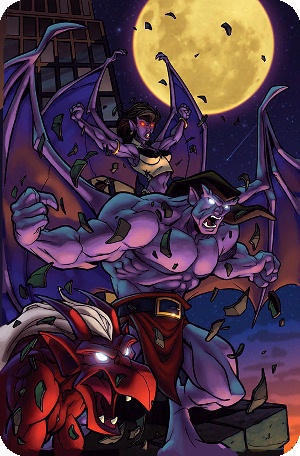 |
|||||||
|
Articles about Entertainment
Books
Cartoons & Anime
Celebrities
Gaming
General/News
Movies
Music
Sports
Television & Online
Travel & Tourism
The Future of Artificial Intelligence-Fueled Entertainment: Unleashing Creativity and Immersive ExperiencesBy Chaz G. T. Patto - June 2023. Artificial Intelligence (AI) has already made significant strides in transforming various industries, and the realm of entertainment is no exception. As AI continues to evolve, it is poised to revolutionize the way we consume and engage with entertainment content. From personalized recommendations and immersive virtual experiences to AI-generated content and interactive storytelling, the future of AI-fueled entertainment holds tremendous potential for enhancing creativity, delivering tailored experiences, and pushing the boundaries of imagination. In this article, we explore the exciting possibilities that lie ahead in the intersection of AI and entertainment. Personalized Content Recommendations: AI algorithms are already transforming the way we discover and consume entertainment content. Streaming platforms, music services, and video-sharing platforms employ AI to analyze user preferences, behaviors, and viewing patterns to offer personalized recommendations. These algorithms continuously learn from user interactions, enabling more accurate and tailored content suggestions. As AI technology advances, the potential for hyper-personalized content recommendations will continue to grow. AI could analyze not only individual preferences but also emotional responses and physiological data to create customized entertainment experiences, ensuring that each user receives content that aligns with their unique tastes and moods. Immersive Virtual Reality (VR) and Augmented Reality (AR) Experiences: AI-driven technologies like virtual reality and augmented reality have already started to redefine entertainment experiences. With AI's ability to create realistic virtual environments, characters, and simulations, the potential for immersive storytelling is vast. In the future, AI-powered virtual and augmented reality experiences could provide interactive and lifelike environments where users can engage with AI-generated characters, explore fictional worlds, and participate in captivating narratives. AI's capacity to adapt and respond in real-time can enhance the level of immersion, enabling dynamic and personalized interactions within virtual environments. AI-Generated Content: Artificial intelligence has already demonstrated its capability to generate creative content, including music, art, and even literature. AI algorithms can analyze vast amounts of existing data and learn patterns, styles, and trends to produce new and original works. In the realm of entertainment, AI-generated content could open doors to novel storytelling formats, imaginative visuals, and unique soundscapes. Collaborations between human creators and AI algorithms may result in unprecedented artistic expressions, pushing the boundaries of what is possible in film, music, gaming, and other forms of entertainment. Interactive and Dynamic Storytelling: AI-powered entertainment experiences have the potential to transcend passive consumption. Interactive storytelling, driven by AI algorithms, allows users to actively participate and influence the narrative outcomes. Through natural language processing and machine learning, AI can understand and respond to user input, creating personalized storylines and adaptive narratives. In the future, AI could enable audience engagement with characters in movies, TV shows, or video games, providing unique and interactive experiences. Users may shape the direction of the plot, make decisions for characters, and see the storyline dynamically adjust based on their choices, creating a truly immersive and participatory form of entertainment. Final Thoughts: The future of AI-fueled entertainment holds immense possibilities for innovation, creativity, and personalized experiences. From personalized content recommendations to immersive virtual reality, AI-generated content, and interactive storytelling, artificial intelligence is reshaping the way we consume and engage with entertainment. While the potential benefits are vast, ethical considerations and responsible deployment of AI in entertainment are paramount. Safeguards must be in place to ensure user privacy, data protection, and the preservation of human creativity and originality. As technology continues to evolve, the collaboration between human creators and AI algorithms will play a pivotal role in harnessing the full potential of AI-fueled entertainment. The future promises a rich tapestry of dynamic, personalized, and awe-inspiring entertainment experiences that blur the line between fiction and reality, transporting audiences to new realms of imagination.
Looking for something to read now that Game of Thrones is over?Canadian fantasy author Charles Moffat (and contributor to the Lilith eZine) has two new books coming out on March 1st 2020. In 1999 Moffat created the fictional fantasy kingdom of Korovia and has been writing books in the setting ever since.
The Blizzard's Daughter
'Blizzards' are wizards who specialize in ice magic (cryomancy) and have undergone a transformation that turns their skin blue. They become immune to the cold, but vulnerable to fire, and their cryomancy magic is enhanced dramatically. They are also very rare as only the toughest wizards can survive the magical transformation without dying...
Shifting Shadows in Iztark
Wulfric the Wanderer has defeated the dark wizards inhabiting the Ivory Tower of Iztark, but upon exiting a strange old man approaches him with the promise of riches if he can assassinate the dark wizard known as Merchant-Lord Phrax Al-Amun. But Phrax's palace and harem full of women is guarded by more than mere mortal guards and the wandering barbarian-turned-assassin will have to battle his way through all manner of dangers and distractions.
|
|
||||||
|
The Future of Entertainment By Charles Moffat - August 2009. The future is well-nigh here. Imagine being able to watch television any time, any where, any show you want, without the advertising. YouTube is just the beginning. It is a sneak peek at the future where video downloading is instantaneous and (for the most part) ad free. Remember downloading mp3s on Napster (see Napster Revolution)? Well Napster was another peak at the future wherein entertainment is free and often user-driven or user-created. And its not just television or music. Its also movies, video games, books, gossip/news, sports, internet browsing and everything else you could possibly want in the palm of you hand. And all this will be based on a subscription or subscriptions to specifics websites or networks. Lets take the popular MMORPG "World of Warcraft" as an example which has broken many sales records. In 2007 the game had over 8 million worldwide... and that number continues to grow. In Summer 2009 there is now 11.5 million active users and has 62% of the MMORPG market, which means there is approx. 20 million MMORPG gamers world wide. Other games like Dungeons & Dragons Online, Age of Conan, Shaiya offer similar fantasy oriented environments. And that is just one genre of online gaming.
There is also violent video games like Counter-Strike, Half-Life, Halo, strategy games like Chess, Backgammon, classic board games, simulation games like the Sims, Second Life and many other game genres that rely on a subscription or a download price. For movies there is already services like NetFlix (and tonnes of other sites) and there are many other sites available for whatever your interest is... But the real clincher is the issue of mobility. Not only do we have new technology like BlackBerry (see CrackBerry BlackBerry) and XO Laptops (see The $100 Laptop), but laptops and other mobile devices are becoming smaller and cheaper. SmartPhones, iPhones, mini laptops, wireless surfing on your cellphone... the sales of such devices is skyrocketing worldwide. Broadband demand rises every year, sometimes attaining 10% or more growth in specific regions. The biggest recent jump was in 2006 when the worldwide telecommunications market grew 11.2% to $3 trillion USD overall. A 2007 report by the Telecommunications Industry Association estimates 87% of internet users will have broadband access by 2010. Within that wireless revenue is expected to makeup 25% of the market by 2010 (compared to only 10% in 2006). “Consumers are thirsty for broadband, and this report shows carriers are rushing to meet the demand,” said Grant Seiffert, TIA president. And then there is the matter of simple telephone service. Services like VOIP, Skype and similar unlimited phone calling are growing in popularity and industry experts say they will eventually become the norm. But what are giving up here? Standards for starters... because the technology to distribute such entertainment is so readily available now, the ability to create such things is also widely available. Our cellphones have video cameras on them. The problem however is that the quality of such video is horrible and the people creating such things are mostly amateurs. Very few people actually have training. We're reached a point where ANYBODY could make a reality TV show... and post it on YouTube. In theory the quality will go up as the technology gets better, but this will never fix the amateur antics of a lot of the videos posted on YouTube. What is needed is more website and books on how to make good quality video, cinematography, sound/video editing and skills that many YouTubers are sorely lacking. Some of this hack quality skills have even crossed over into main stream television, a fact which further degrades TV's quality as a medium of entertainment. True, amateur videos can be quite funny, but who really wants watch blurry video that is badly cropped, barely edited and the sound is crap? Oh and the people acting are no talent hacks looking like they are doing a high school skit. I have no doubt that the quality of online entertainment will improve given time, but there will also be a sea of amateur videos that clog up the internet with dogs sneezing, teenagers kissing and adults getting drunk / acting stupid. Sure, we will be able to view it wherever we are whenever we want, but we need to maintain professionalism and standards.
The Future of Sports EntertainmentBy Charles Moffat - April 2013. I apologize in advance for ranting a bit. You've been warned! Reality TV shows really set the bar low when it comes to entertainment. Usually its average joe people running some kind of silly obstacle course race, pitting themselves against other average joes - some of which might be more physically fit and thus have a physical edge on the competition. Budget wise its super cheap to produce too. No need to hire actors. Just need to screen the idiots willing to be on the show for criminal records, hire a host / narrator, offer some big reward, and then sit back and let the cameramen chase the fools around doing whatever silly tasks they have to do. Reality TV? Pff! How is any of that nonsense real? Yes, okay, its "real" people instead of actors - and no stunt actors either. But trying to call shows like Survivor, Amazing Race, Big Brother, etc "reality" is no more real than anything else that is a performance - because its "real" people still playing out a role. They know the cameras are on them. They probably have some drama experience from highschool (or they're just really good at faking it because naturally good liars)... Ergo, they're still acting. Now when it comes to real sports - football, baseball, basketball, soccer, hockey, rugby and so forth there is no acting there... Or is there? I admit every time I see an injured football or soccer player on the field and 5 minutes later he is walking around, totally uninjured at all, that isn't so much acting as the guy wanted a break so his team could have a brief rest period to rethink their strategy and catch their breath. Because if they don't then the referee just blows his whistle and the game resumes.
So yes, there is certainly faking going on in professional sports too. And we see it again and again whenever a reporter interviews an athlete. A typical athlete response will be: "Well you know I am all about trying my best and being out there, giving 110%, but today, you know the other team just gave 115% and... yada yada yada... we lost somehow because the other team was better." Honestly it would be nice if athletes answered questions honestly for a change instead of spouting rhetoric in the same manner a politician does (politicians are another group of skilled actors / liars). It does happen sometimes. One of the greats at actually being honest during an interview is Mike Tyson (who will openly admit to his own problems) and say things like "Who cares? We're in a fight anyways. What does it matter?" when asked about whether he takes his rage into the ring with him. And do you know why Mike Tyson is so honest? Its because he is angry. People when angry have a tendency to tell the truth. They're not acting any more, they're not spouting rhetoric or lies. They tell the truth because they're fed up with the nonsense. And while I may not like Mike Tyson as a person, I can still respect the fact that he is honest when he is being interviewed. (Note: That doesn't mean he is always honest. If he is in a good mood he probably does lie a fair bit because he isn't feeling angry any more.) Which comes back to my original reason for writing this: The direction that modern sports entertainment is going is in the direction of entertainment and acting. Acting is an ever increasing part of professional sports. Remember the WWF (World Wrestling Federation)? Or as it is now called, the WWE (World Wrestling Entertainment, Inc.), a company which showcases "wrestling" as entertainment, but it is really more of a soap opera with no resemblance at all to traditional (Olympic style) wrestling. Well the WWE was founded in 1952 and has gone through many changes over the past 61 years. It is a big business now with over $3.3 billion in total assets and annual revenue of approx. $650 million. And its all an act. True, the injuries are real, but primarily the wrestlers involved in the WWE are actors. Many of them even go into professional acting careers, including Dwayne "The Rock" Johnson, who showcased his acting abilities in films such as The Scorpion King, Get Smart, and most recently G.I. Joe: Retaliation. And will play Hercules in an upcoming film due out in 2014. Now take this in perspective, if the WWE has gone towards becoming a soap opera, what about more recent developments MMA / UFC?
UFC (Ultimate Fighting Championship) is a rival to the WWE in many ways because its focus is on mixed martial arts and incorporates wrestling, boxing, Brazilian Jiu-Jitsu, Tae Kwon Do, Muay Thai, karate and many other styles. In many ways it is more like boxing because it isn't an act. The competitors aren't acting when they are in the ring, nothing is faked. But like boxing the promos, saying their lines before a fight... well, that is acting. But its kept pretty much to a minimum because its expected for them to have a scripted speech that can be used as a promo before the fight. (Often the fighter may not speak English very well and will have to read off a teleprompter script in English just for viewers in English speaking countries, and repeat the process in other languages.) So knowing that various sports are just going in that direction, what can we predict for the future? #1. More scripted interviews - because athletes cannot be trusted to talk on their own sometimes. #2. More sports where everything is planned out, right down to who wins and how. 100% faked. #3. More violence and sexploitation in sports. (Because it gets higher ratings, sells more tickets and people aren't paying to watch PPV that much any more when they can just download a sporting event instead.) #4. More sports that mimic reality TV shows (or reality TV shows that mimic sports). #5. Relatively boring sports will get jazzed up a bit. I think I need to explain this more because I didn't really touch this topic above. Example: Archery is a boring sport to watch. It is because it is over too quickly. Each round gets 3 arrows, the competition has multiple elimination rounds, until two archers make it to the finals. Really, its very boring to watch. But imagine if they changed the rules dramatically? Imagine if the targets moved around while shooting at them? What if there were cheerleaders distracting the archers and messing them up mentally so they can't concentrate? Oh what a more interesting sport that would be then... I think that is why hockey has so much fighting in it. If you've ever gone to a hockey game and you don't see a single fight, chances are likely you will think the hockey game was pretty boring. #6. Many televised sports can't live without sponsors. So we should see a lot more sports that are "owned" by sponsors. Example! Companies like Red Bull are sponsoring sporting events like crazy. Red Bull (according to my last count) sponsors 17 different sporting competitions. It has reached a point where companies aren't just limiting themselves to competitions either, they're also sponsoring academic research. eg. The Gatorade Sports Science Institute. #7. Seemingly inexplicable new sports will appear and garner support... and later disappear... or be purchased as a franchise. eg. The Pillow Fight League (PFL), which appeared years ago, is currently for sale. The people operating it are apparently looking to sell the intellectual property rights / etc to a sponsor. Wanna bet that Red Bull will purchase it? I could keep ranting but I think I have made my point. The sports entertainment industry is going to continue changing towards anything that is more lucrative financially. Maybe someday we will even have "Deathrow Gladiator Fights" and other things that violate our very sense of morality - but will be so intensely popular because they will essentially be snuff films on your TV set. Honestly, football, hockey and boxing already kills quite a few athletes already. More if you count spectator sports like Nascar. So it really isn't so different when you consider we already have sports that kill people. Even the Luge is deadly (the 2010 death of Luge athlete Nodar Kumaritashvili during a practice run for the 2010 Olympic Games). So ultimately, violence appears to be the direction that sports entertainment is going? Anyone care to disagree with me? Start your own sports rant website and write a retort.

Battle Archery Vs Throwing Axes, which is Best?By Charles M. - April 2017. Well, this might largely depend on your personality as to whether you prefer archery or throwing axes, but nevertheless for the sake of argument, lets go through the Pros and Cons of both Battle Archery and Throwing Axes. Pros of Battle Archery Cons
Pros of Throwing Axes Cons So which do you decide to do? Well, what if you didn't have to choose? What if you could do both axe throwing and combat archery at the same location? Sports de Combat in Montreal offers just that. At one location you can do both combat archery, axe throwing, and even sign up for archery lessons in Montreal. And better yet, the activities / archery lessons are available in both English and French. So regardless of your preference, you are good to go. Definitely a place to add to your tourism list of activities when visiting Montreal.
|
|||||||
|
|
|||||||













